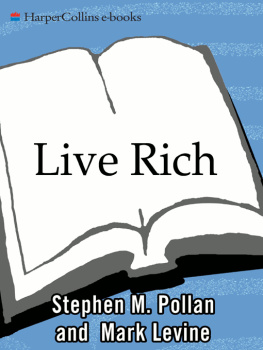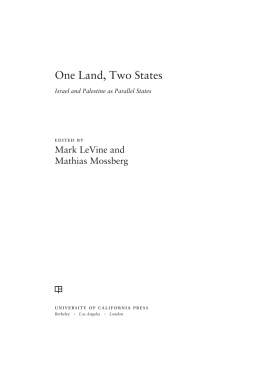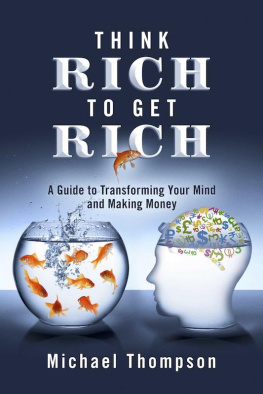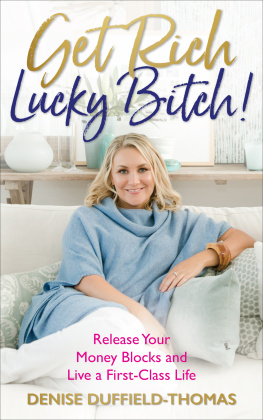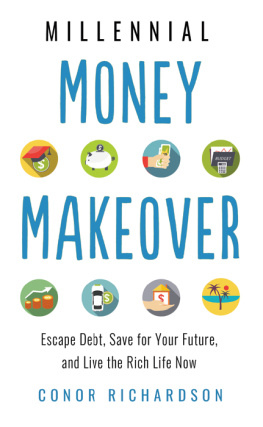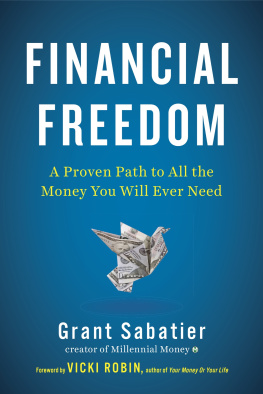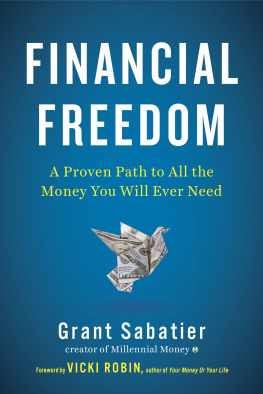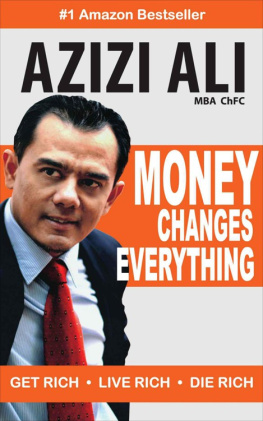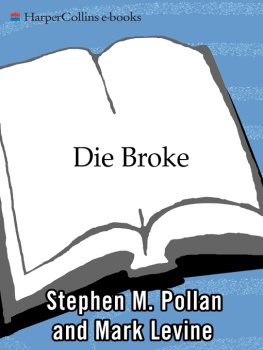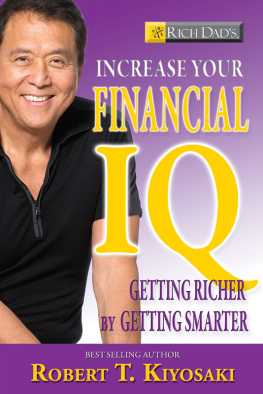Stephen M. Pollan and Mark Levine
Wed like to thank our agent, Stuart Krichevsky, for helping us set a goal, and then having the faith to stick with us for the ten years it took to reach it.
Thanks to our editor, Adrian Zackheim, for helping us finally see the individual trees lost in the forest of our own ideas.
Thanks to our wives, Corky Pollan and Deirdre Martin Levine, for showing us what living rich really means.
Thanks to the clients of Stephen Pollan, P.C., for letting us draw on their lives and experiences in order to help others.
Thanks to Jane Morrow for letting us tap into her memories and observations.
Thanks to John Koten and Laurence Hooper for helping us develop and refine our contrarian instincts.
Thanks to Gary Ambrose, Shelly M. Greenwald, Richard Koenigsberg, Mike Powers, Stuart Rosenblum, Gabriella Rowe, Kenny Tillman, and Emmanuel Zimmer for letting us borrow their expertise.
Thanks to Randy S. Newman, Anthony Scamurra, Abraham Romano, Craig Kessler, and Liz Petschauer for their continued support.
Finally, wed like to thank the following experts whose advice and writings were among the varied threads we needed to help people weave their own rich lives: Joel Best, William Bridges, Timothy Butler, Susan Campbell, D. Lee Carpenter, Stan Davis, Alan Dershowitz, Paul and Sarah Edwards, Martha Friedman, Herb Goldberg, Adolf Guggenbhl-Craig, James Hillman, Sara Horowitz, Neil Howe, Robert Hughes, Susan Jeffers, Wendy Kaminer, John Kotter, Landon Y. Jones, Richard Leider, Robert T. Lewis, Henry Clay Lindgren, Russell A. Lockhart, Terri Lonier, Stanton Peele, Tom Peters, William Strauss, Charles Sykes, James Waldroop, Bob Waterman, and Bernie Zilbergeld.
Live rich. When you come down to it, isnt that what we all want? To live the life of our dreams?
For some, living rich means owning a magnificent, well-appointed home, perhaps on the beach. For others, its being able to buy whatever they want, for themselves or others, without worrying about the price tag. Still others, myself included, think it means traveling the world, first class (at least business class), and staying in four-star hotels. Creative individuals dream of being able to write or sing or paint or sculpt without worrying about paying their rent. The spiritually motivated want to be able to spend time getting closer to God, whether it takes the form of meditative prayer or feeding the hungry. Everyone has a personal vision of what goes into a rich life.
Theres one common element, however: freedom. Look at all the different dreams of a rich life, and youll see every single one is based on having the freedom to do whatever you want to do. Living rich is having the freedom to live on the beach, to buy whatever you want, to travel the world, to create art for arts sake, or to spend your life in service to God. Living rich is also having the freedom to set aside your fears and seize the reins of your life. To live rich is to be free, and to be free is to live rich.
Living rich isnt the same as being rich. No one whose mind is healthy really equates a rich life with being wealthy. Money in and of itself isnt what we want. But what we do want may be able to be purchased with money.
Obviously it takes money to buy that house on the beach, to purchase all those lovely things, and to afford first-class travel. But it also takes money to be able to do nonmaterial things, like create art or lead a life of prayer. All of us, even artists and contemplatives, live in a capitalist world. It takes money to obtain the necessities of lifefood, clothing, and shelter. That money comes from either our own work or the work of others.
Someone, somewhereperhaps a spouse or a parentis working so the idealistic artist can spend time painting. And someone, somewhereperhaps some wealthy materialist paying $10 for a jar of preservesis working so the devoted Trappist monk can spend all his waking hours at prayer.
You might not be comfortable acknowledging it, but money plays a big part in whether youre able to live rich, to be free.
So far, it seems that living rich would be pretty simple. Since youre the one who decides exactly what living rich means, and since moneyin one way or anotheris what enables you to pursue that dream, all you need to do is get enough money to fulfill that dream. But if thats the case, if its really that simple, how come so few of us actually live rich?
FROM DIE BROKE TO LIVE RICH
Two years ago I wrote a book called Die Broke . It advocated treating assets as resources to be used, in whatever way you choose, during your lifetime, rather than as treasures to be hoarded and passed on after your death. I wrote it in response to what I saw in my own consulting practice. Im an lawyer and financial adviser on Manhattans Upper East Side. My practice is small, but offers a wide range of services: I help my clients with everything from their personal finances to their careers and businesses. I offer very personalized service. Thats why I was deeply affected by what I saw happening just a few short years ago.
I saw my clients diligently follow all the rules of personal finance theyd been taught (by me as well as by other authors and advisers), yet still find themselves falling short of their goals and dreams. In my search to help them, I discovered it wasnt my clients who were failing, it was the system. They were simply following a misguided philosophy and outdated rules designed for an economic environment that had disappeared.
After a great deal of thought and research, I came up with what I thought was a new, more workable, more effective philosophy of personal finance, along with a set of simple, pragmatic rules: Quit today, pay cash, dont retire, and die broke.
The response to Die Broke exceeded my wildest dreams. With all due modesty, I knew my philosophy and advice on personal finance worked. After all, I see the positive results every day in my office. However, I didnt realize the extent to which my clients financial fears and frustrations were echoed in the general public.
Admittedly, my client base isnt a cross section of the American population. While my clients come from a variety of ethnic, social, cultural, and religious backgrounds, most are middle- and upper-income New Yorkers between the ages of twenty-five and fifty. I didnt know so many people of other ages and from other places would find the Die Broke philosophy helpful in eliminating the frustrations they felt with their personal finances. I suppose, whatever else you can say, positive or negative, about New York baby boomers, one thing is clear: They are on the cutting edge of social and financial trends. The success of Die Broke and the realization that my clients fears and hopes were no different from those of the rest of the population has led me to offer the advice from the other part of my consulting practice.
I take, for lack of a better word, a comprehensive approach to my clients financial lives. As I mentioned, I get very involved in their world. Rather than working with them on just one element, say their investments, I treat their money and their circumstances as a mosaic of various pieces that make up what I call the business of living. Die Broke dealt with one half of the business of living: spending money. This book, Live Rich , deals with the other half of the business of living: earning money.

